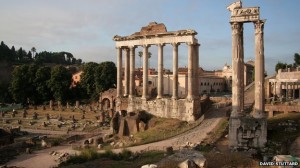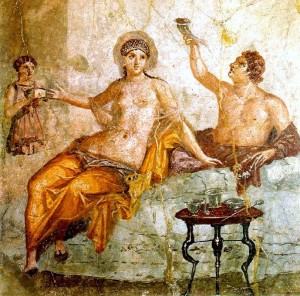Did the Romans invent Christmas? What an odd question, the Romans were pagans for the first 300 years of Christianities existence. Well it’s not really such an odd questions because as we’ll see Christianity has been very clever in subsuming pagan festivals and replacing them with their own, especially when the exact dates of some Christian festivals cannot be pin-pointed precisely (see our article on Was Jesus really born on December 25th?)
“Io Saturnalia !” : Two thousand years ago this was the seasonal greeting which would have chimed out across most of Europe, not “Merry Christmas”. The Roman mid-winter festival of misrule has heavily influenced many Christmas traditions – including the time of year we celebrate.
At no point is a date for Jesus’s birth given in the Bible, but references to the lambing season have led some theologians to conclude that he was born in spring, whilst other clues indicate autumn (see our article on Was Jesus really born on December 25th?). Why then do we celebrate his birth in the middle of winter?
Saturnalia
For seven days from the 17 December it was party season in Roman times. Homes were decorated, parties held and slaves became masters – at least for one banquet. It was the start of a lengthy mid-winter period of merry-making and the season of goodwill – Saturnalia.
Saturnalia originated as a farmers’ festival and commemorated the dedication of the temple of Saturn, the Roman god of agriculture and the harvest.
During this festival, there was a reversal of traditional roles, with slaves wearing fine garments and sitting at the head of the table. Families gave each other gifts, and homes were decorated with wreathes and greenery. Gambling was allowed and the festival is described as a joyful period. People would go also go round the streets and there was merry-making and singing songs, which we could of course associate with modern carolling
Morphing into Christmas
Originally a one-day feast at the end of autumn, however Saturnalia gradually moved to later and later dates, with longer celebrations, throughout the Roman period to the extent that by the time of Christian conversion, in the early 4th century, it was running into and incorporating a number of other Roman festivals. These included the Opalia – the festival day for Saturn’s consort Ops – on the 19 December and the Sigillaria- the day of present-giving – on the 23 December. On 25 December it was dies natalis solis invicti – the birthday of the ‘invincible’ Roman sun-god Sol.
In October 312 AD the Emperor Constantine the Great converted to Christianity and decreed that it would be the official religion of the Empire. Cancelling Saturnalia was unthinkable, so instead Christian Rome converted it to a Christian holy day instead.
Coexistence
Pagan ritual and Christianity coexisted for many decades after the conversion of Constantine the Great. This period was not always harmonious, especially in the fourth century, with tense and bloody episodes between the new Christian elite and those who still worshipped the old gods.
Festivals like the Lupercalia – held in February – where men ran through the streets of Rome naked, whipping women with strips of goat-hide, were still marked by Pagans and Christians alike.
Other Pagan Traditions
As well as Roman traditions, rites and rituals from the Vikings and Anglo-Saxons have survived into our modern celebration. The tradition of kissing under the mistletoe is sometimes attributed to the Viking goddess of love and marriage – Frigg – whose legend is associated with the plant. The origin of the traditional Christmas tree may also linked to Pagan tree-worship.
So next time you kiss under the mistletoe, sing a carol or pull a Christmas cracker think back a few thousand years to the masters and slaves of the Roman empire and the festival of misrule.
Related Articles
| ⇒ | The Magi – a new revelation ? |
| ⇒ | Was Jesus really born on the 25th December? |
| ⇒ | The Tipping Point – The Day Rome Embraced Christianity |









You must be logged in to post a comment.